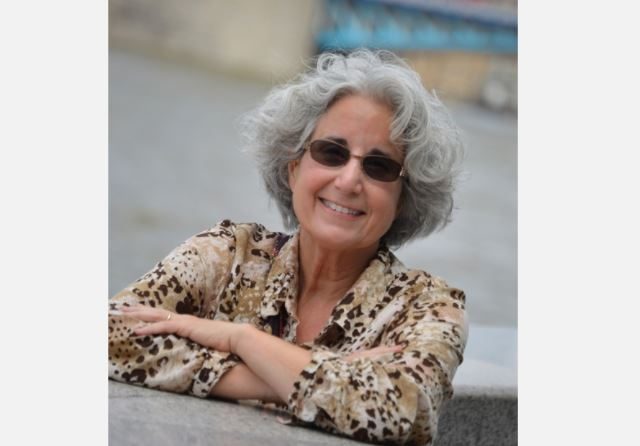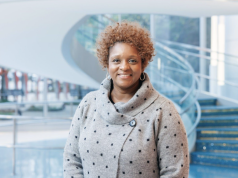By Javacia Harris Bowser
For The Birmingham Times
When you think of the Birmingham Civil Rights movement of the 1960s, certain names immediately come to mind: The Rev. Dr. Martin Luther King Jr., the Rev. Fred Shuttlesworth, and the Rev. Ralph Abernathy, to name a few. But there are others that award-winning author T.K. Thorne wants you to know.
In her new book, “Behind the Magic Curtain: Secrets, Spies, and Unsung White Allies of Birmingham’s Civil Rights Days” (New South Books, June 29, 2021), Thorne reveals little-known and lesser-told stories of white residents who helped Birmingham’s Black community fight for equality and justice.
Many of the stories highlighted in the book are about members of Birmingham’s Jewish community, such as attorney Abe Berkowitz, an outspoken supporter of Civil Rights who didn’t hesitate to confront segregationist Public Safety Commissioner Theophilus Eugene “Bull” Connor, and Betty Loeb, who led the local chapter of the National Council of Jewish Women in efforts to improve laws, voting rights, and social welfare—which included providing books, supplies, and free eye exams to children, regardless of race.
When Black Birmingham attorney J. Mason Davis couldn’t dine at a certain lunch spot where other downtown lawyers could because it served “Whites Only,” Jewish attorneys Karl Friedman and Jack E. Held lunched with Davis from the vending machine in the courthouse basement, establishing a friendship that persevered over the years. They would go on to become partners at Birmingham’s Sirote and Permutt law firm.
When Thorne was approached in 2013 by a group of local lawyers and leaders about writing “Behind the Magic Curtain,” the author was intimidated by the proposal.
“I was overwhelmed,” she said. “The scope of what they were asking seemed huge.”
Still, the group thought Thorne would be the perfect writer for the project. She thought she’d been tapped for this undertaking because of her book “Last Chance for Justice,” which follows the investigation into the 1963 Sixteenth Street Baptist Church bombing.
“I thought, ‘These guys think I’m a Civil Rights expert,’ which I was not,” said Thorne, who learned that her historical novel, “Noah’s Wife,” had won them over.
“One of the gentlemen said, ‘Anybody that can write a book about Noah’s wife thousands of years ago and make me believe that’s what really happened can write this book,’” Thorne said with a laugh.
“True Calling”
Born Teresa Katz, Thorne grew up in Montgomery, Alabama. The oldest of three (her sister is a graphic artist and glass designer who lives in Alabama, and her brother works for a Johns Hopkins physics lab in Maryland), Thorne didn’t want to be a writer or a police officer when she was younger. She had dreams of becoming an astronaut.
“What I really wanted to do was meet aliens,” she said. “I thought that would be the coolest thing.”
Her father told her that her eyesight wasn’t sharp enough for the job.
“He didn’t mention that only male fighter pilots in the U.S. Air Force were astronauts at that time,” she said. “I was pretty crushed, and I had no idea what I wanted to do from there.”
Eventually, Thorne discovered a love for writing. “From the time I was three or four years old, I loved telling stories, and I was always the kid on the block that directed the plays,” she said. “By the time I was 15, I knew writing was my true calling of my true self, but I also realized that I wasn’t going to be able to make a living doing that, so I would have to do that while I did something else.”
And Thorne wanted that “something else” to be about helping others.
“My mom was very much involved in making the world better,” Thorne said of her mother, who was a lobbyist for the Alabama League of Women Voters and an advocate for environmental issues who also worked for education, constitutional, and judicial reform, in addition to fighting to end poll taxes. “That was my example in life.”
Thorne, a retired Birmingham Police Department (BPD) captain and former director of City Action Partnership (CAP), has authored four books. Her award-winning historical novels “Noah’s Wife” and “Angels at the Gate” reimagine classic Bible stories from the perspectives of unnamed, briefly-mentioned women in the book of Genesis—the wives of Noah and Lot. With “Last Chance for Justice,” Thorne delved into nonfiction. She also tried her hand at writing a tale of murder, mystery, and magic with her book “House of Rose.”
Thorne earned a master’s degree in social work from the University of Alabama. After getting married, she and her husband moved to Birmingham in 1976, and her studies led her to the BPD to research the force’s social work program and later to work as an intern.
After finishing college, Thorne was hired to be a grant writer for the department. To better understand what the officers needed, she had to ride along with them—and she fell in love with it: “I think the thing that attracted me to it was you never knew what was going to happen next.”
She signed up for the police academy and would go on to serve for more than two decades with the BPD, retiring as a precinct captain.
Thorne, 67, believes her police background helped her with writing and researching “Behind the Magic Curtain.”
“Part of researching this book [involved] being a detective, so I chased down things from that perspective,” she said. “I want to know what the facts are, I want to know the truth is, so that mindset helped.”
She worked for nearly eight years on the book, for which she interviewed 50 people, read several books by people involved in the movement, and reviewed videos housed at the Birmingham Civil Rights Institute.
Woven throughout “Behind the Magic Curtain” are the firsthand recollections of Tom Lankford, a Birmingham News reporter who was embedded with law enforcement during the 1960s.
“I was a police officer in a transitional period, so I heard stories about and knew the culture of what he was dealing with,” Thorne said.
Lankford was part of the group that approached Thorne about writing the book, and his captivating stories helped convince her to take on the project. Once she started reading his notes, she said, “I was hooked.”
Looking Back to Move Forward
 Thorne hopes that as her book sheds light on unsung heroes of history it will help readers better understand the present and pave the way for a brighter future.
Thorne hopes that as her book sheds light on unsung heroes of history it will help readers better understand the present and pave the way for a brighter future.
“In the 1960s, racism was in your face, and it was embedded in the law,” she said. “Now the white community has a hard time seeing it because it’s not like it was when my generation grew up. As a person who’s not affected by it, it’s taken me a long time to figure out what is meant by structural racism, and I’m still learning.”
Thorne hopes “Behind the Magic Curtain” will open people’s eyes to the roots of the systemic racism that continues to plague our society, breeding injustice and unrest.
Richard Friedman, associate editor of Southern Jewish Life magazine and former executive director of the Birmingham Jewish Federation, believes Thorne’s new book is much needed.
“The Civil Rights story is not just history. It has a continued relevance to the way we live our lives,” he said, adding that sharing little-known stories of white allies can show people that they can make a difference.
“We tend to think of the great battles of our time being waged by those soldiers who are out front, and they play a very important role, no question,” Friedman added. “But the reality is these battles are for the civic health of America, and the people behind the scenes play a much larger role than we tend to think.”
Friedman believes highlighting the Civil Rights movement contributions of Birmingham’s Jewish community, who were also grappling with anti-Semitism in the South, is particularly important.
“It’s a lesson in that, even as you are navigating your own predicament, you can’t become immune and insensitive to those locked in a larger struggle and a deeper struggle,” he said.
Thorne agrees and hopes her book urges others to be brave and fight for what’s right today.
“If those people could stand up, then we need to also,” she said. “We need to not be silent now.”
Signed copies of T.K. Thorne’s “Behind the Magic Curtain: Secrets, Spies, and Unsung White Allies of Birmingham’s Civil Rights Days” can be purchased locally at Alabama Booksmith (2626 19th Place S., Birmingham, AL 35209) or online at https://www.alabamabooksmith.com/signed-copies/behind-magic-curtain-secrets-spies-and-unsung-white-allies-birminghams-civil-rights. The author will discuss her book during the “Legends, Lessons and Legacies: The Jewish Community’s Impact on Birmingham’s Civil Rights Movement” Zoom event, which will be moderated by Southern Jewish Life and Israel InSight Editor Larry Brook and co-sponsored by the Atlanta Israel Coalition; the event is scheduled for June 21 at 7 p.m. Central, and registration is available online (https://us02web.zoom.us/webinar/register/WN_FtD3T3c2Qn-I-yLjG1jHSw). Also, Thorne will also host an in-person signing of “Behind the Magic Curtain” and her new novel “House of Stone” at Temple Beth-El (2179 Highland Ave., Birmingham, AL 35205) on July 15 at 6 p.m. Central; registration is available at TKThorne.eventbrite.com.




